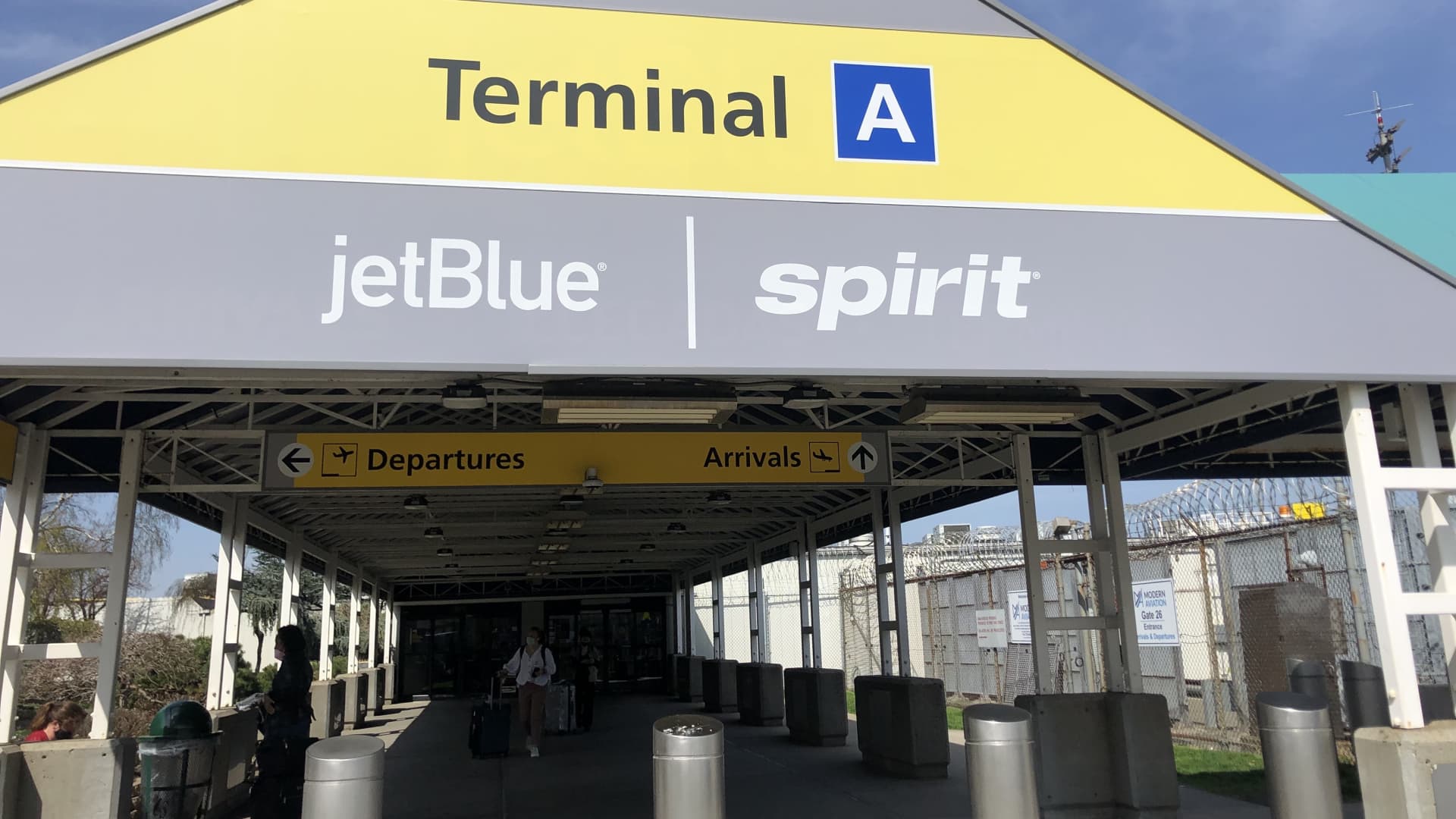LaGuardia International Airport Terminal A for JetBlue and Spirit Airlines in New York.
Leslie Josephs | CNBC
A federal judge Tuesday blocked JetBlue Airways‘ purchase of Spirit Airlines after the Justice Department sued to stop the merger, saying the deal would drive up fares for price-sensitive consumers by taking the discount carrier out of the market.
JetBlue’s proposed $3.8 billion purchase of discounter Spirit would have produced the country’s fifth-largest airline, a deal the airlines had said would help them better grow and compete against larger rivals like Delta and United.
“JetBlue plans to convert Spirit’s planes to the JetBlue layout and charge JetBlue’s higher average fares to its customers,” U.S. District Court Judge William Young wrote in his decision. “The elimination of Spirit would harm cost-conscious travelers who rely on Spirit’s low fares.”
The decision, handed down Tuesday, marks a victory for a Justice Department that has aggressively sought to block deals it views as anticompetitive.
“Today’s ruling is a victory for tens of millions of travelers who would have faced higher fares and fewer choices had the proposed merger between JetBlue and Spirit been allowed to move forward,” Attorney General Merrick Garland said in a statement. “The Justice Department will continue to vigorously enforce the nation’s antitrust laws to protect American consumers.”
The DOJ alleged in its lawsuit, filed in March, that JetBlue’s acquisition of the budget airline would force many passengers to pay higher fares by eliminating Spirit and “about half of all ultra-low-cost airline seats in the industry.”
Spirit has grown rapidly in recent years by offering cheap fares and fees for everything else from seat assignments to carry-on luggage, a no-frills model that has become a favorite punchline for late-night comedians.
“Spirit is a small airline. But there are those who love it,” Young wrote in his ruling. “To those dedicated customers of Spirit, this one’s for you.”
Spirit shares plunged after the ruling and ended the day down 47%, while JetBlue’s stock gained about 5%.
Spirit’s market capitalization as of Friday’s close was $1.66 billion, less than half of JetBlue’s proposed purchase price. The Miramar, Florida-based airline has been struggling with grounded airplanes due to an engine manufacturing issue and softer-than-expected travel demand.
Spirit Airlines and JetBlue Airways stock after a federal judge blocked the carrier’s proposed merger.
JetBlue and Spirit said in a joint statement that they disagreed with the ruling and were evaluating next steps.
“We continue to believe that our combination is the best opportunity to increase much needed competition and choice by bringing low fares and great service to more customers in more markets while enhancing our ability to compete with the dominant U.S. carriers,” the carriers said.
A different U.S. District Court judge in Massachusetts sided with the Justice Department last year to block JetBlue’s regional alliance with American Airlines in the Northeast, a partnership that allowed the carriers to coordinate routes and schedules.
JetBlue and Spirit said Tuesday that “JetBlue’s termination of the Northeast Alliance and commitment to significant divestitures have removed any reasonable anti-competitive concerns that the Department of Justice raised.”
Hard-won deal
JetBlue fought hard for Spirit. It launched a hostile takeover bid weeks after Frontier Airlines and Spirit agreed to merge in a cash-and-stock deal. Frontier’s business model is more similar to Spirit’s, and both airlines have similar fleet configurations, unlike JetBlue’s more full-service model which stands in contrast to Spirit’s discount strategy.
After Spirit’s board rejected JetBlue’s initial takeover offer, Spirit CEO Ted Christie said in May 2022 that he didn’t think a JetBlue deal would be approved by regulators, citing the American Airlines partnership and JetBlue’s plan to take seats out of the market.
“It will not happen in our opinion and for that reason our board has rejected it and to imply otherwise again, we think is insulting,” he said on CNBC’s “Squawk Box” at the time.
Spirit shareholders ended up rejecting the Frontier deal and months later approving a sweetened JetBlue proposal in October 2022.
New CEO
Judge Young’s decision leaves New York-based JetBlue grappling with next steps, tasking incoming CEO Joanna Geraghty with steering the airline on a new path. Geraghty was announced as successor to CEO Robin Hayes after he said earlier this month that he would retire.
JetBlue argued access to Spirit’s similar fleet of Airbus planes would allow it to grow quickly when planes and pilots are in short supply, growth it said it needs to compete against bigger airlines. The carrier operates in highly congested airspace in New York and other cities, and had planned to use Spirit as a way to gain access to more routes and travelers.
Years of previous consolidation left United, Delta, American and Southwest in control of about three-quarters of the domestic market.
JetBlue planned to remodel Spirit’s yellow planes by removing the branding and seats from the tightly packed jets to provide more of a full-service model.
“Although Spirit’s yellow aircraft livery would not immediately be repainted as JetBlue planes, at the moment the merger is consummated, Spirit and JetBlue would no longer be competitors,” Young wrote in his decision.
Don’t miss these stories from CNBC PRO:

